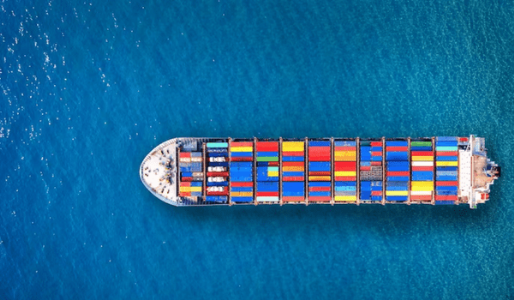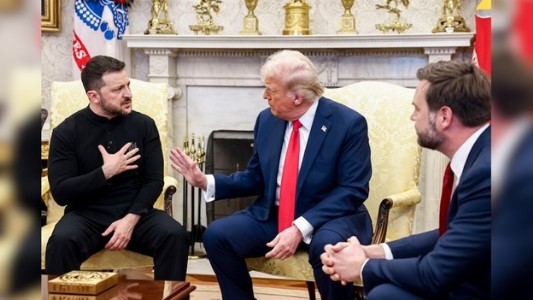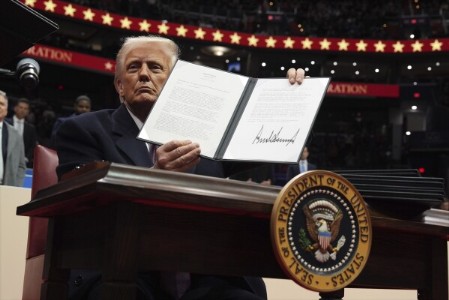The Maldivian Crisis and the China angle
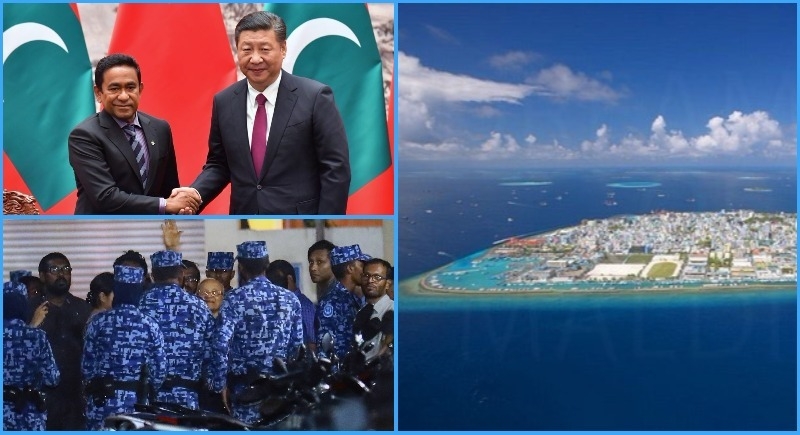
The Maldives received full independence from the British in 1965 and formally declared itself as a Republic in 1968 following a referendum ending the 853-year-old monarchy. From the Arab traders, Colonial rulers to the 21st century global powers all recognize the Strategic importance of Maldives as it lies in the conjunction of a major trade route between the Gulf of Aden and Strait of Malacca carrying around one third of the world’s Oil export and about half of the world’s total container shipments. Apart from economic interests, Maldives is of immense strategic importance due to its proximity to the Indian mainland located merely 300 km from the southern coast of India.
INDO-MALDIVIAN BILATERAL RELATIONS
Maldives and India have enjoyed strong historical, cultural, economic and strategic relations. Later being the first to recognize the Maldives as a sovereign nation after receiving independence from the British in 1965. From establishing its first mission in at Male in 1972, India has shown its unflinching support to the Island nation and as quoted by its former President Maumoon Gayoom that India is a time-tested friend had shown its commitment whenever the tiny island nation had to face adverse conditions. From rescue and relief efforts during the 2004 tsunami to foreign Exchange crisis in 2009 to the drinking water crisis of 2014, India had extended every possible support to the Maldives.
The Maldives being an island nation relies heavily on imports to fulfil its agricultural needs; from the establishment of the first bilateral trade agreement in 1981 India had provided for its food grains requirements at very favourable rates upholding its commitment towards the bilateral agreement.
According to the data provided by Federation of Indian Export Organization the bilateral trade between India and Maldives was USD 183.39 during the year 2015-2016 and USD 159.13 million in the year 2016-17(April to January). After the UAE and the Singapore India scores the third position as a supplier of goods to the Island Nation. It is also noteworthy that Maldives Imports from India had remained Stagnant for the last six years at 11% while imports from countries like China have grown from 2.9% to 8.1% in the same period. It is also worth mentioning that the current President of the Republic of Maldives Abdulla Yameen had been up to some extent hostile to trade and strategic interests of India in the region.
“According to Mr Brahma Chellany, a renowned professor of strategic studies at the Centre for policy research stated that though the Maldives is a small economy yet it is strategically very important and increasing Chinese investments is limiting its abilities to make foreign policies”
Before delving into the controversial undertakings against India by the current Maldivian regime it is worth mentioning about the amount of aid and Institutional help India has been providing from starting of its first mission in Male. Some of the notable undertakings by India worth mentioning are:
India is a leading development partner of Maldives and has established many of the leading institutions of Maldives including the Indira Gandhi Memorial Hospital (IGMH), Faculty of Engineering Technology (FET) and Faculty of Hospitality & Tourism Studies(IMFFHTS).
India has offered assistance to the Maldives whenever required. After the tsunami that struck the Maldives on December 26, 2004, India was the first country to rush relief and aid to the Maldives. India provided a budget support aid in view of the serious financial difficulties being faced by the Maldives on account of the tsunami and related factors. The assistance of US Dollars equivalent of Rs.100 million in July 2007 as assistance was given following tidal surges in May 2007.
India has provided the US $ 100 million Stand-by Credit facility (SCF) to the Maldives, including long-term loans and revolving credit for the trade. Under new Line of Credit USD $40 million is offered by the Government of India to the Maldives.
SBI had been playing a pivotal role in the development of Maldives since February 1974 by providing loan assistance for promotion of island resorts, export of marine products and business enterprises. In 2009 SBI also bailed out Maldives of a serious foreign exchange crisis amounting to $100 million USD.
OPERATION NEER: Apart from financial aids India also helped the Maldives from a serious Drinking water crisis 2014 when its only desalination plant went out of order. India rushed its two ships with onboard desalination plants along with airlifting packaged drinking water to bail out Maldivian citizens of drinking water shortage.
OPERATION CACTUS: a group of Maldivians led by Abdullah Luthfi and assisted by armed mercenaries of a Tamil secessionist organization from Sri Lanka, the People's Liberation Organization of Tamil Eelam (PLOTE), tried to overthrow the government and detain the president Maumoon Gayoom in a coup attempt. The coup failed due to timely intervention by the Indian Army, the military operation was code-named Operation Cactus by the Indian Armed Forces.
Besides financial and humanitarian Aids, India had immensely contributed through the various capacity building and scholarship Initiatives to establish communication between citizens of both the countries. From the former President Maumoon Gayoom to the first democratically elected president Mohammad Nasheed, Indian enjoyed close ties with the Island Nation. The bitterness in Indo-Maldivian relations started when following a Coup Mohammad Nasheed was forced to step down from his office Making Mohammed Waheed Hasan as an interim president. One of the first acts that Mohammad Waheed did on becoming the interim president was to cancel some major agreements between Indian Companies and Government of Maldives. In 2013, after winning the national elections, progressive party of Maldives presidential candidate an graduate from the American University Beirut, Lebanon took charge as the new President and was believed to be close to the UAE and China. From signing a free trade Agreement with China to the selling of Islands to UAE and China under the guise of Infrastructure development projects, the present Maldivian regime had repeatedly discarded Indian concerns in the region. Ties saw further strains when the current Maldivian president tried to jail the First democratically elected former president Mohammed Nasheed by pressing false charges of Terrorism when the former was well known for his liberal policies that agitated Fundamental Islamic parties like the Adhaalah Party to previously breaking away from Nasheeds' alliance.
The present government had gone to the extent of parting away from the decades-old tradition of joint Naval and military exercises. The Government of Maldives has recently declined Indian Navy's invitation for a joint naval exercise Codenamed “MILAN” proposed to be the largest of its kind in the region with participation from 16 countries. The move was supposedly taken by the Yameen regime as they were cautious of offending China, it is estimated that the Maldivian government currently owes around 70% of the total foreign debt to China, Surpassing the total interest payable by 20% of the total budget available with the Maldives. The Chinese Debt trap is a well-known tool used by the Communist nation to fulfil its strategic interests.
The manner in which the 1000 page FTA was passed in the Maldivian Parliament or Majlis, invited sharp criticism from the opposition as even after a repeated request by the opposition the FTA was not handed over for a review and was hastened through within a short time span of less than an hour. The Maldivian Democratic Party registered a strong protest and also organized a press release opposing the opacity observed in the entire process.
The GMR Issue is probably one of the most widely discussed issues in regards to INDO-MALDIVIAN relations. In 2010 a Bangalore Based Firm the GMR entered into a Concession agreement with Government of Maldives and the Maldives Airports Company Limited (MACL) to develop the Ibrahim Nasir International Airport (INIA). The agreement came to an abrupt end when the then President Mohamed Nasheed was forced to step down from the office following a coup in 2012. The Successive Interim President and then the newly elected president both Scrapped the deal citing charges of corruption in the awarding the agreement. The charges of corruption were refuted by their very own Anti-Grafts Committee. Under the disguise of awarding the agreement to its Maldivian agency MACL, the Yameen Regime awarded the deal to a Chinese state-owned Firm “BEIJING URBAN CONSTRUCTION COMPANY LIMITED” during the Chinese premier’s maiden visit to the island nation in 2014.
“Nasheed defended the GMR contract in an op-ed published in Mihaaru on November 10, contending that his debt-ridden administration would have received USD $2.9 billion or MVR45billion from GMR in the 25-year concession period “without having to spend a single laari on the airport. -The Maldives Independent
Later GMR was awarded a compensation of $270 million by a three-member International Arbitral Tribunal Singapore, covering the loan interests of Bourne by GMR male and the equity invested. Another such incident occurred when an other Indian company Tatva Global Renewable Energies agreement awarded by the Nasheeds’ Government was refuted abruptly by the current regime without citing any valid reasons. Such hostility by the current government had created serious fault lines in the Indo-Maldivian Relations.
THE MALDIVIAN POLITICAL CRISIS
The Maldivian state throughout the decades had always been through political turmoil’s or sometimes a questionable Authoritarian regime. From the first president of the first Maldivian Republic Late Abdulla Amin Didi to the First president of the Second Maldivian Republic Ibrahim Nashir to the present leader of the Island Nation Abdulla Yameen, the political history of Maldives had been through a roller coaster ride of Coups and Referendums.
The Maldivian Political Turmoil
The Maldivian political turmoil started catching the world’s attention from Maumoon Abdul Gayoom's term when he was successful in defeating his predecessor Ibrahim Nashir sometimes referred to as an authoritarian ruler and impossible to defeat. Maumoon Abdul Gayoom from the inception of his presidency ruled over the Island Republic for over a period of Thirty Years ranging from 1978 – 2008. The three decades of Gayoom's Rule saw three Major Coupe attempts, though the first two attempts of 1980 and 1983 weren’t successful in inflicting serious damage and danger but the third Coupe attempt caught eye of the international community, where a group of 80 heavily armed mercenaries belonging to “PLOTE “ took the entire capital island of Male hostage in an attempt to capture the then President Gayoom. But a timely military invasion by the Indian Paratroopers helped in eliminating the threat and securing the Maldivian nations political stability. The following years of reign by Abdul Gayoom saw increasing Bilateral ties with India with increasing Economic and Strategic cooperation.
In 2008, Mohammad Nasheed a former political prisoner under Maumoon Gayoom's regime was declared the presidential candidate by the United Maldivian opposition defeating Maumoon Gayoom. This was the first time that the country had held a multi-party presidential election by popular vote and hence Nasheed was elected into the top job was also referred as the first democratically elected president of the Republic of Maldives. An advocate of environmental awareness, Nasheed government took many steps to raise awareness of climate change and global warming. His first cabinet held under water caught the attention of international arena. His commitment to making the Maldives a carbon neutral nation also received a widespread applause. Nasheed government made efforts to cement Indo-Maldivian Bilateral relations and saw increased strategic and economic cooperation’s. The Nasheed regime came to an abrupt end when in late 2012 when a coup forced him to resign from the office.
THE BACKDROP OF THE COUP:
President Nasheed implemented a number of policies often termed to be Liberal by Nasheeds conservative alliance partners. The last major alliance partner to be part of Nasheeds alliance government, the Adhaalth party broke away from the alliance citing his liberal policies of establishing resorts and exempting them from restrictions of serving alcohol and pork in the predominantly Muslim state. After parting ways from the alliance, the Adhaalth party along with other orthodox parties took to the streets protesting against the regimes liberal policies. Matters became chaotic when Nasheed ordered the arrest of Maldives head of criminal judge sparking massive protests. Mohamed Najeem a former security officer and Abdulla Riyaz the then deputy police commissioner of Maldives lead a protest outside the headquarters of Nasheeds party seeking his resignation. On 7th February Nasheed tendered his resignation citing being forced to resign at gunpoint. Following his resignation, the Maldives saw massive protests, unrest and clashes among the supporters of both the sides. After Nasheeds resignation from office, the then Vice President Mohammed Waheed Hasan took charge as the interim president installing the two coup leaders as minister of Defence and commissioner of police respectively. What rose further suspicion was awarding two cabinets seats to the conservative Islamist party often claimed by critics of having fundamental elements. Some of the immediate undertakings by Waheed interim regime was to roll back many policies implemented by the Nasheeds Government.
Abdulla Yameen a graduate from American University Beirut Lebanon and has obtained his master’s in public policy from Claremont graduate school LA, USA. Yameen had worked in numerous cabinet positions under his half-brother and then President Maumoon Gayoom. From Minister of trade and industries, minister of Higher education social security to tourism and Civil Aviation. After Maumoon Gayoom broke away from his earlier party “Dhivehi Rayyithunge party” citing corrupt practices, in 2011 Maumoon Gayoom founded the Progressive Party of Maldives with Islamism and Islamic democracy as its founding ideology. In 2013 progressive party of Maldives came into power making Maumoon Gayoom's half-brother Abdulla Yameen as the president of Maldives.
UNDER THE REGIME OF ABDULLA, YAMEEN RADICALIZATION HAS REACHED A NEW HIGH. The archipelago accounts for the highest amount of foreign Fighters fighting in Syria for Islamic State. The scale of Radicalization and the present regime's inefficiency in tackling it will give way to more Radicalization. A recent survey by an independent news agency found that the government of Maldives had failed to identify and document Islamic state fighters returning from Syria. The authoritarian rule imposed by Yameen had caused his half-brother and PPMs founder Maumoon Gayoom to part ways and to form a united opposition joining hands with his one-time opponent, critic and former president Mohamed Nasheed. From the inception of his presidency, the Yameen regime had been caught amidst allegations of Massive illegal deals and embezzlement of state funds.
These Charges on the regime received fresh stir after massive data leak from two private phones belonging to the former Vice-president of Maldives were investigated by an international Media house. The former Vice-president was considered a close aide of Maldivian president Abdulla Yameen and carried out day to day affairs of the government.
Zaheena Rasheed, Editor of the Maldives Independent alleged that the current regime was using the state for carrying out illegal activities like money laundering and awarding Deals to companies owned by relatives. The Massive data leak reveals charges of selling out lagoons and Islands to foreign nations. Mohammed Jamil belonging to the united opposition of Maldives charged the Yameen regime of embezzling up to $300 millions in corrupt island deals. The data leak also provides insights about bribing officials ranging from police to supreme court Judges. With virtually consolidating power over the judiciary and police Adeebs phone also sheds light on exercising extra-judicial power in silencing critics and opponent voices from media to people in constitutional posts. Details on a senior member of the supreme court judge Ali Hameed considered a close aide of Yameen and charged by the oppositions of working out judgements to favour the current regime was also uncovered through the Data Leak. Ali Hameed though recently caught in a Sex scandal was later cleared by the police under suspected intervention from the president’s office amidst massive uproar and protests by Maldivians.
Ibrahim Niyaz the former Auditor General of Maldives uncovered massive corruptions in Island deals for around 60 Islands and Lagoons. One such Island deal involving the Magau Island was handed over to an Italian Hotelier for less than $2.5 million when its estimated value was set to be around $10 million. The illegality of this deal can arrive at the fact that the entire deal was done behind closed doors while the law states for an open bid call. Apart from the manner of awarding the deal, evidence of the deal been brokered by a Mafia leader named TC dave was also found and was later established from information received through the Data Leak. Ibrahim Niyaz, who unearthed the entire scam was later sacked by the president after submitting his report to the president’s office and even received death threats. Later Ibrahim Niyaz fled to Sri Lanka following threat to him and his family.
RADICALISATION OF MALDIVES & CHALLENGES FOR INDIA :
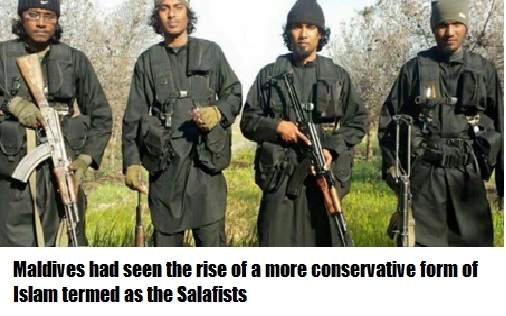 Maldivian society a predominantly Sunni Muslim country had traditionally been successful in preserving its moderate view of Islam. But more recently the Maldives had seen the rise of a more conservative form of Islam termed as the Salafists. Many socio-political thinkers have pointed out the increasing influence of UAE as one of the major contributing factors. The UAE has been lately sending in religious leaders to Maldives an also been providing scholarships to Maldivian students to study in Saudi universities.
Maldivian society a predominantly Sunni Muslim country had traditionally been successful in preserving its moderate view of Islam. But more recently the Maldives had seen the rise of a more conservative form of Islam termed as the Salafists. Many socio-political thinkers have pointed out the increasing influence of UAE as one of the major contributing factors. The UAE has been lately sending in religious leaders to Maldives an also been providing scholarships to Maldivian students to study in Saudi universities.
These factors have contributed immensely in exposing the youth to radical factors. The Soufan Group, an International strategic consultancy firm that has been monitoring the inflow of foreign fighters into Syria said that the count of Maldivian fighters in Syria has crossed the mark of 200 fighters in-contrast to the official count released by various Maldivian and International authorities who earlier claimed it to be not more than 100 fighters. The Maldives Independent on an Article published in April 2017 reported a story of 12 men and women from the same family leaving the Maldives to fight in Syria. The family belonged to a very remote island in the Maldivian archipelago with only 544 residents.
The entire Maldivian archipelago is scattered around 1200 islands and atolls and poses a serious challenge to administer and monitor all of these islands to check radical influx. With as many as 200 fighters currently fighting in Syria, no serious effort has been given to documenting these fighters in case they choose to return or set up Jihadi bases in one of these remote islands. They could carry out operations for many years before being detected by agencies. Many strategic thinkers and experts on radicalisation believe that strategic priority of Maldivian radicals is not to capture or establish a caliphate in the Maldives but to establish an Islamic state in the Indian subcontinent region that will give them a superior strategic advantage in the entire Indian Ocean region as well as South East Asia.
This proposition is a looming threat for India, as India can Ill-afford the rise of a radical nation in its doorstep. With already radical countries like Pakistan and Bangladesh and increasing influence of China, India needs to keep a strong vigilance with an appropriate show of strength if necessary to deter such threats.
With the Maldives being the second country to enter into a Free trade agreement with China in the south-east Asian region after Pakistan, it is safe to draw a conclusion that combination of these two anti-Indian hostile forces of radicalism, one being ideological in nature and another being religious in character will put up a serious strategic challenge for India. Hence the need to act strongly in-time is of utter importance for India and at the same time the need to ensure and protect democracy in Maldives rises.



